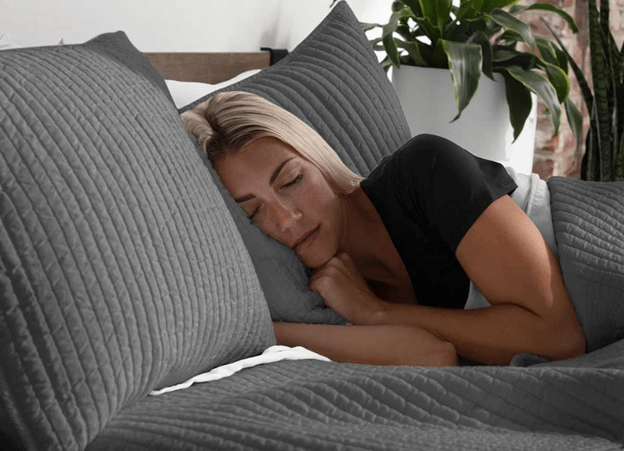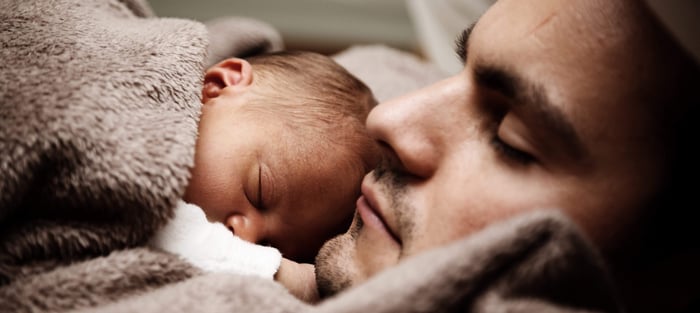If you feel like you can’t stop stressing about work, you’re not alone. From a monster commute to a never-ending workload, it’s easy to feel overwhelmed. Workplace stress is real, but the good news is that there are ways to manage it before it takes over your life.
If work stress is affecting your sleep, simple things like getting enough exercise and investing in performance bedding that prevents overheating can make a big difference.
Does Working From Home Reduce Stress?
Research shows that working from home can reduce self-reported stress and increase productivity. Yet, there’s been a major push by employers to return workers to the office in the wake of the COVID-19 pandemic. Whether you work remotely or in an office, stress can quickly lead to burnout, especially if you’re having trouble sleeping.
If you’re asking yourself, why can’t I sleep when I’m stressed, it’s worth taking some time to understand the longer-term consequences of stress affecting sleep. We’ll explore that ahead and look at some ways you can reduce stress and improve your slumber.
Connection Between Stress and Sleep
Forty percent of U.S. workers say they experience office stress, and 25% say work is the most dominant source of stress in their lives. For many people, work stress is affecting their home life, and insomnia from work stress is common.
Honestly, it’s not surprising. There’s a multitude of potential stressors that can affect you while you’re at work.
It could be a heavy workload, a stressful commute, an overbearing boss, aggravating coworkers, an overall dissatisfaction with your position, and the list goes on. If you work remotely, you might also experience the stress of working from home with kids.
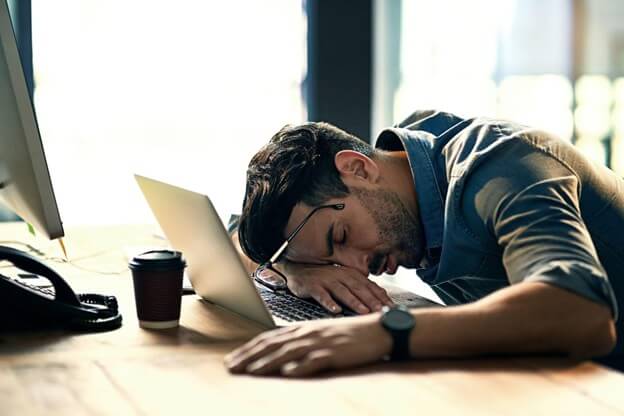
Does Stress Affect Sleep Quality?
Whenever you’re exposed to stress for a prolonged period, the duration and quality of your sleep can suffer. Work-related stressors can trigger the autonomic nervous system in your body to release a burst of stress hormones, including cortisol—your body’s natural alarm system.
This discharge creates a surge of energy by raising your heart rate, which circulates your blood to the necessary organs and muscles to prepare your body to either take action or run away from a stressful event. This natural reaction to stress is known as the fight-or-flight response.
The heightened hormone levels drop to normal once the situation passes, but if it doesn’t, that’s when trouble starts to kick in. For one, stress hormones are not conducive to achieving a relaxed state of being.
When you don’t get a good night’s sleep, your body keeps releasing these hormones, making you even more stressed out. While the chemicals associated with deep sleep help tame the production of stress hormones, if you’re not getting enough sleep, you can miss out on this benefit.
But how do you really know whether stress is disrupting deep sleep? Here are a some physical, cognitive, and emotional signs watch out for:
- Drowsiness and fatigue
- Trouble concentrating
- Brain fog
- Memory problems
- Frequent yawning
- Slower reaction time
- Headaches and dizziness
- Increased appetite and cravings for sugary or fatty foods
- Irritability
- Mood swings
- Heightened emotional reactivity
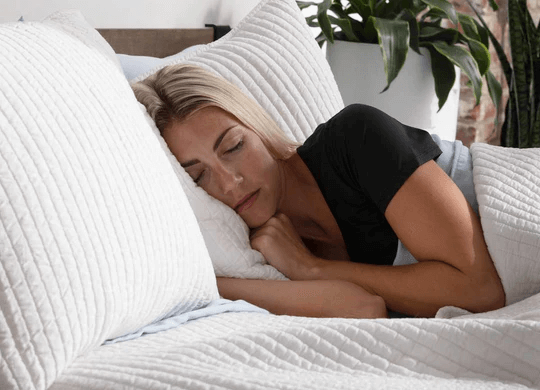
Reduce Stress to Improve Sleep: Here’s How
Whether it comes from work or your personal life, stress is a normal part of everyday life. But if it starts to affect how much sleep you get and your quality of sleep, it’s time to take action. Sleep deprivation can cause a huge range of problems, from brain fog to increased risk of infection.
If you’re wondering how to relieve stress from work, here are some stress management tips to help you get things under control:
- Detect the root cause of stress. This is the first action you must take to manage your stress. Once you detect the source of your discomfort, you can take steps to alleviate it. Consider scheduling a cognitive behavioral therapy session. Even in a video consultation, a counselor or therapist can help get to the bottom of your anxiety and provide ways to change your perspective on a stressful situation.
- Move your body. You can’t go wrong with exercise if you need to blow off some steam. It’s no secret that exercise is excellent for your physical health, but research suggests it’s also an effective treatment for reducing symptoms of anxiety and stress. Aim for at least 30 minutes of physical activity a day. If the thought of running on a treadmill for a half hour bores you to tears, find something that’s more social like an online yoga class or in-person high-intensity interval training (HIIT).

- Try meditation or deep relaxation. A study by Harvard researchers found that mindful meditation can relieve anxiety and mental stress. The best part is that it can be done anywhere and only takes 5 to 10 minutes out of your day. Simply focusing on your breathing can help you relax and release tension in your body, making it easier for you to drift off to sleep. There are many meditation and deep relaxation apps you can use right from the comfort of your own home.
- Get the right bedding. If you want to know how to get better sleep at night, the first thing to evaluate is your sleeping environment. If you toss and turn at night or wake up due to overheating, this could be disrupting your sleep cycles and preventing you from getting deep, rejuvenating sleep. SHEEX® performance bedding features innovative technology to help you sleep cooler at night. The Ridiculously Soft® fabrics are breathable and moisture-wicking, ensuring your sleep is longer, cooler and better than ever.
- Find a hobby. Have you always wanted to learn how to play an instrument? Or wanted to try painting, or baking? Research suggests that having a hobby outside your 9-to-5 job not only helps improve your work performance but also your stress levels. Making time for whatever activity brings you joy and relaxation can really make a difference in helping you to fall asleep.
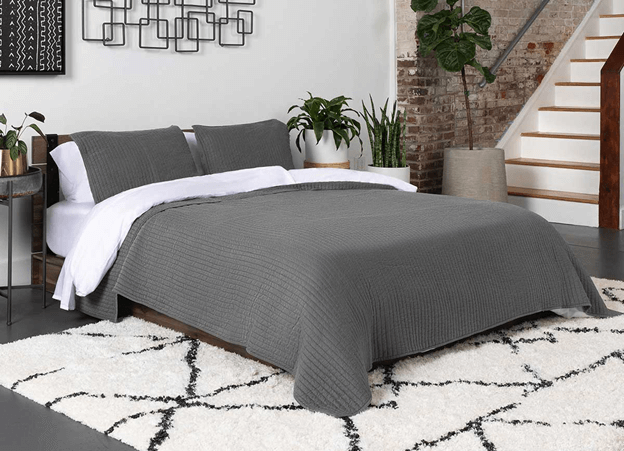
Get Better Sleep with SHEEX® Bedding
Transform your sleep with SHEEX® performance bedding. Our cooling sheets, comforters, duvet covers and coverlets, mattress pads, pillows, and sleep accessories feature cutting-edge technology designed to regulate temperature, wick away moisture, and keep you cool all night long, so you wake up feeling refreshed and well-rested. Upgrade to the ultimate in comfort and performance—because better sleep starts with better bedding.





